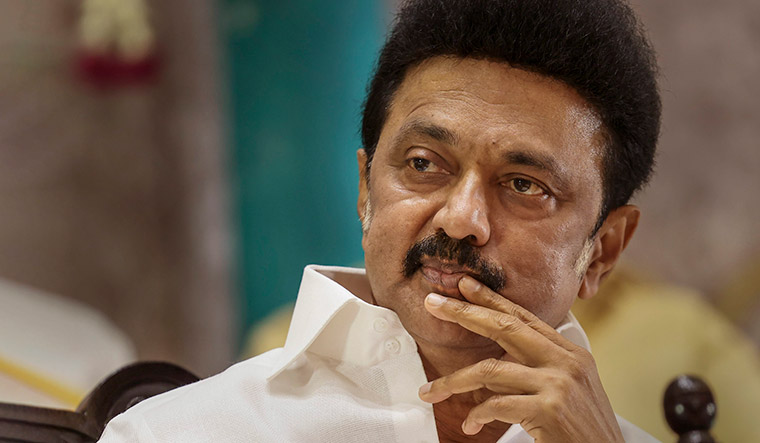It is a pleasant Monday morning in Chennai. Fort St. George, the seat of power in Tamil Nadu, is busy as usual. Cars with red beacons move in and out of the colonial-era complex, ferrying VIPs. The police soon clear the way for Chief Minister M.K. Stalin's cavalcade. As THE WEEK team waits outside the chief minister's office, we meet Industries Minister T.R.B. Raaja, who explains why investors from across the world pick Tamil Nadu as their favourite destination, although he concedes that there is stiff challenge from Gujarat these days.
As we step into the chief minister's chamber, he greets us warmly. Stalin wants Health Minister Ma. Subramanian to join the conversation. Also present is Stalin's son, Udhayanidhi, who is the minister for sports and youth affairs. Stalin, the leader of the Dravida Munnetra Kazhagam, is now a key figure in the opposition's mission to launch an anti-BJP front ahead of the 2024 Lok Sabha polls. On March 1, the day he turned 70, Stalin reiterated the importance of a united front to take on the BJP at a public meeting in Chennai. Rejecting the idea of a third front, he made a fervent appeal to parties opposed to the BJP to fight the Lok Sabha polls together. The Congress remains a key element in Stalin's plans.
Stalin has a tight schedule for the day and the worried looks on the faces of his staff and Chief Secretary Shiv Das Meena mean that the chief minister will give his detailed answers later, in writing. And he does not disappoint. In an exhaustive interview, Stalin touches upon a range of issues, including opposition unity, the role of Nitish Kumar, the importance of the Congress and Rahul Gandhi, the tense encounters with Governor R.N. Ravi, the north-south divide and why he believes that another term for Modi will hurt the idea of India. Excerpts:
Q/ On June 23, you were in Patna with other opposition leaders for discussions on a united front against the BJP. How are things progressing?
A/ The Patna meeting has sent out a strong message that the whole of India has come together to save democracy and constitutional ethos. Our detractors said we would never come together. They said we would not be able to organise even a meeting, that we would not reach a consensus and that we would break up after just one meeting. All these [criticisms] have been proved wrong. Leaders from all over India have come together. This has given me huge confidence. We will definitely achieve our political target.
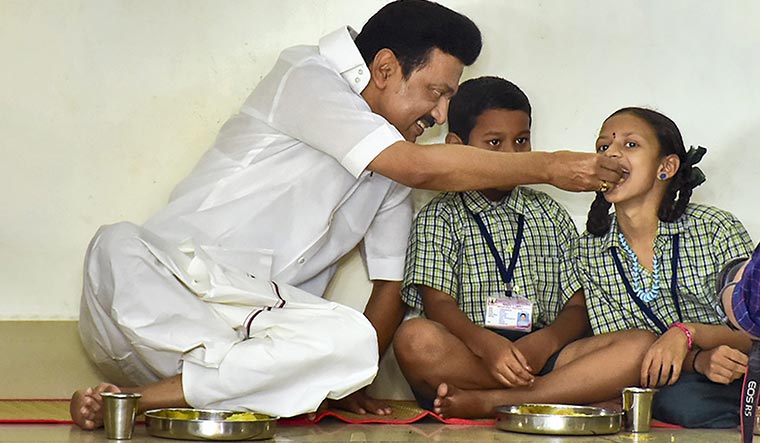 Healthy start: Stalin inaugurating the 'Chief Minister’s Breakfast Scheme' for students in Madurai | PTI
Healthy start: Stalin inaugurating the 'Chief Minister’s Breakfast Scheme' for students in Madurai | PTI
Q/ You are now the fulcrum of opposition unity. Also, it was you who first said that an alliance without the Congress could not go forward.
A/ I said we should join hands with the Congress and oppose the BJP. Forming a third front only helps the BJP indirectly. The BJP keeps winning only because the parties opposed to it do not come together. In the Lok Sabha elections, our only target is to bring the BJP down. All the political parties will come together for this. Differences between the Congress and a few regional parties will fade away in due course.
Q/ How do you see Nitish Kumar’s role as a unifier?
A/ For something to go forward, we need a guiding power. Nitish Kumar is that guiding power for us. He is known all over India. He was a Union minister, and has a long-time relationship with political leaders across the country. Nitish is ideologically committed. He is the disciple of Jayaprakash Narayan. He is calm and firm. I strongly believe that he will make sure that the opposition comes together.
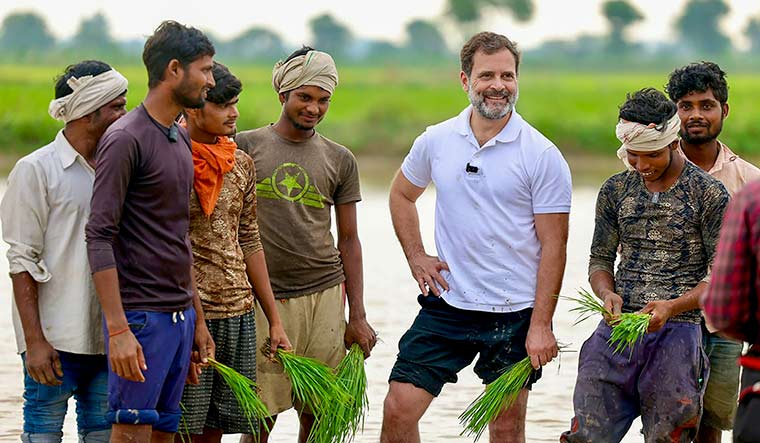 Congress leader Rahul Gandhi with farmers in Haryana's Sonipat district | PTI
Congress leader Rahul Gandhi with farmers in Haryana's Sonipat district | PTI
Q/ What are your suggestions for Nitish?
A/ I have given a few suggestions at the Patna meeting:
i) The regional party which is strong in a state can lead the alliance in that state. ii) If an alliance is not possible, seat sharing can be done. iii) If that, too, does not work, a common candidate can be fielded. iv) It may not be proper for parties to come together in an alliance after the election. v) A common minimum programme must be worked out among the political parties. vi) A joint action committee should be formed to ensure the smooth functioning of the alliance.
Q/ Can Mamata Banerjee play a role in these efforts? There are concerns about the Congress and the left parties not supporting her in West Bengal.
A/ Mamata Banerjee has joined as an important leader in the coming together of the opposition parties. [What] you are pointing out is specific to [assembly elections] in West Bengal. When it comes to Lok Sabha elections, she took part in the Patna meeting, along with the Congress and the left parties.
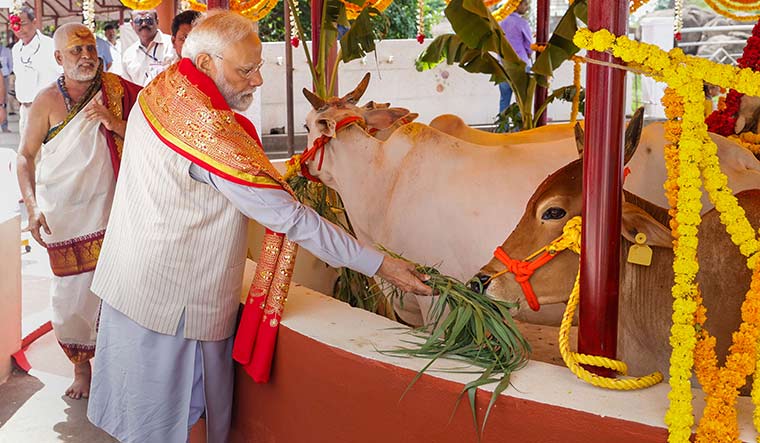 Spiritual sojourn: Prime Minister Narendra Modi feeds cows during his visit to a temple in Warangal | PTI
Spiritual sojourn: Prime Minister Narendra Modi feeds cows during his visit to a temple in Warangal | PTI
Q/ If all of you come together, do you believe that the BJP can be beaten?
A/ Of course. If the front is formed, the anti-people BJP will be defeated.
Q/ Are you keen on opposition unity in the upcoming assembly elections in states like Rajasthan, Madhya Pradesh and Chhattisgarh?
A/ Yes. In the upcoming state elections, the BJP will be defeated in a majority of the states. The BJP lost Karnataka. The party fears that it will lose the Parliament elections, if it loses the upcoming state elections. So I am hearing that the BJP has plans to hold the five assembly elections along with the Parliament elections.
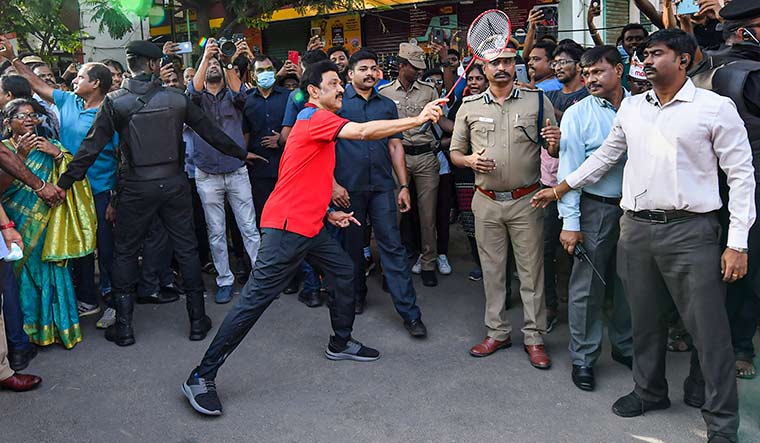 Smart game: Stalin plays badminton as part of the 'Happy streets' initiative of Chennai Corporation | PTI
Smart game: Stalin plays badminton as part of the 'Happy streets' initiative of Chennai Corporation | PTI
Q/ Do you think that the Congress and Rahul Gandhi should give concessions to regional parties that are stronger in certain states?
A/ In the Parliament elections, even if the regional parties are strong in their respective states, we need an all-India face, and that is the Congress. The Congress is the party that ruled India for most years after independence. Our PSUs and the five-year plans were brought in by our first prime minister, Jawaharlal Nehru. That respect should definitely be given to the Congress.
Q/ Has Rahul Gandhi changed after the Bharat Jodo Yatra?
A/ Rahul Gandhi’s yatra has been a huge victory. He is looked at as India’s hope.
Q/ How do you look at the impact of the BJP continuing its rule at the Centre?
A/ The BJP has turned a peaceful India into a fearful India. Our country is a union of states and the BJP is trying to destroy the states. It is trying to change India, which is a country for all, into a nation with just one language and one religion. The BJP is trying to make India an autocracy. It wants to destroy our Constitution. If the BJP wins again, India will not remain the same.
Q/ At the Patna meeting, you got to meet Farooq Abdullah and Mehbooba Mufti. How do you perceive the situation in Kashmir, especially after the abrogation of Article 370?
A/ The peace that prevails in Kashmir now is not real peace. It is like saying that a man is silent after tying his hands and legs, and gagging him. The Union government abrogated Article 370 after keeping all political leaders in Kashmir under house arrest. The BJP behaves as if only Kashmir had special rights. There are many northeastern states with special rights. Does the BJP have the courage to abrogate those rights? The abrogation of Article 370 was not an achievement. It was a wound in the minds of the minorities.
Q/ Do you think the north-south divide is deepening? Will the BJP go ahead with the delimitation of the Lok Sabha seats if it wins the next elections?
A/ To punish states like Tamil Nadu and Kerala, which have implemented the population control scheme in a proper manner, the number of constituencies will come down. The north Indian states which did not implement the population control scheme properly have recorded an increase in population and will get more Lok Sabha seats. The BJP is trying to implement this system only to take revenge on the south Indian states which did not vote for it. The party thinks that it can be implemented if it wins the next elections.
This will have a lot of political consequences. The south Indian states will be completely ignored. Already the Centre has taken away our financial sources by introducing the GST. Our education rights, too, have been taken away. While we put in efforts to bring in new investments and progress, the Union government usurps all our earnings. The only place to raise all these issues is our Parliament. If our voice is not heard even there, what can we do? So we will have to look for an alternative along with other regional parties.
Q/ There are complaints from many states about the functioning of the governors. Tamil Nadu, too, is facing a similar situation.
A/ From the day he took over as governor of Tamil Nadu, R.N. Ravi has been trying to create confusion. We have tried to make him see this many times, but he does not seem to change. The statement released by the governor dismissing minister Senthil Balaji from the council of ministers was a breach of constitutional norms. It also went against administrative discipline. Appointing or dismissing a minister is the sole right of the chief minister. No one else can interfere in that. Just because the governor administers the oath of office, it does not mean that he can appoint or dismiss a minister. He should understand this first.
He should do the duties assigned to him. He has not approved the bills passed by the assembly. He should sign those bills first. Instead of doing that, he is poking his nose in everything else and now he stands with his nose broken. He does not like Tamil Nadu developing and remaining peaceful. He wants to spoil the state by creating confusion.
Q/ Do you think all states that face frequent troubles with governors should have a common way of dealing with it?
A/ Abolishing the post of the governor is the only way.
Q/ Tamil Nadu has long been an industrial powerhouse. Now, the Union government is pushing infrastructure projects in a big way. How will you ensure that Tamil Nadu remains a part of the next big leap?
A/ We have taken several steps to lead Tamil Nadu along the path of development and to ensure financial progress for our people. We are organising the 'Global Investors Meet' in January 2024. In order to play an important role in India’s financial growth story, we plan to become a trillion dollar economy by the financial year 2030-2031. For this, we need an investment of Rs23 lakh crore. We also need to create jobs for 46 lakh people. Within two years of our government taking over, Tamil Nadu has turned into a state that attracts investments.
Q/ Tamil Nadu is one of the first states to provide welfare assistance to people. Prime Minister Modi calls it 'freebie culture' that hurts the economy.
A/ The Gujarat BJP promised voters two cooking gas cylinders. In Karnataka, the party promised three cylinders. But Prime Minister Modi is against freebies. Are these state units not under his control? Freebies are unavoidable in a country where there is poverty and a huge population. The Supreme Court itself has accepted this. 'We can’t stop political parties from making promises before elections. But what are the right promises? What is the right way to spend the public money is our basic question,' said the chief justice of India. 'Can free electricity and subsidies for fertilisers given to farmers be considered freebies? Can free health service, water and electricity be considered freebies? We should [take into account] the differences in peoples’ earnings and opportunities. The Constitution itself says this,' said the apex court.
The government exists to support the needy. We cannot keep quiet by saying that nothing can be given free of cost. It is only during the rule of Prime Minister Modi—who complains about freebies given to the needy—that loan waivers worth crores were given to corporates. Were those freebies or some help in exchange for something else?
Q/ Small scale industries and MSMEs (micro, small and medium enterprises) have been a source of strength for Tamil Nadu. But in the past few years, these sectors have been affected by global developments and Covid-19. How do you plan to address the situation?
A/ The industries sector and the MSMEs have bounced back. In the MSME sector in India, Tamil Nadu holds the third position. There are at least 50 lakh MSMEs in Tamil Nadu, which is 7.8 per cent of the total in India. We have increased the financial allocation for MSMEs to Rs741.96 crore in 2021-22, Rs1,025.10 crore in 2022-2023 and Rs1,502.11 crore in 2023-24.
Q/ The state budget says Tamil Nadu is expecting an expenditure of Rs 3.08 lakh crore to pay salaries, pensions and interest on loans (revenue expenditure). The state has only around Rs 45,000 crore left to spend on infrastructure and new wealth creating projects. On top of this is the revenue shortfall of Rs 37,540 crore. What are the government's plans to avert a fiscal crisis?
A/ We came to power when Tamil Nadu was facing an acute financial crisis. But that did not deter us from delivering what we wanted. We have reduced the revenue deficit. We have delivered on a majority of the promises that we made. From September 15, we are going to roll out Magalir Urimai Thogai (a basic income scheme for women). Under the scheme, one crore women heads of households will receive a monthly allowance of Rs1,000 each.
Q/ What is the difference between Stalin, the opposition leader, and Stalin, the chief minister?
A/ Both are jobs for the people. I argued and fought as opposition leader. As chief minister, I sign and deliver on what I promised.
Q/ The BJP and Prime Minister Modi talk about dynastic politics to target the Gandhi family. Is there any merit in that argument?
A/ Prime Minister Modi calls us dynasts because he does not have anything else to complain about us. This is an accusation that I have been hearing for the past 30 years. I request him to think of something new.


